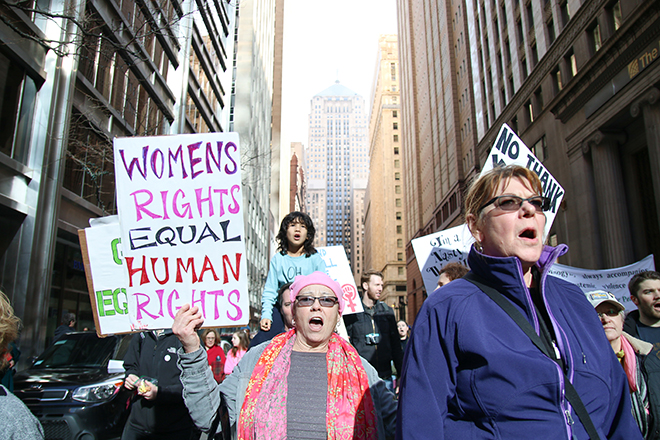
Last Saturday, an estimated 250,000 people gathered for the Women’s March protest in Chicago. On Wednesday night, about 40 people gathered in Chambers Hall to participate in the Women’s Center’s “After the March” conversation in order to delve more deeply into some of the themes from last week’s protests and find out how to move forward.
Many of the students and staff in attendance talked about how they felt empowered from the march, but weren’t sure where to go next. Emma Sarappo, a Medill sophomore and the Women’s Center’s student worker, gave many examples of how people can get involved at the local level, and talked about her experience fighting for women’s rights even though she comes from a conservative hometown.
“There have been times I’ve been overwhelmed,” Sarappo said, “but, for me the fight is an obligation – to me, to my sisters, to my brothers, to the whole world.”
Many of the students and staff in attendance discussed feeling empowered from the march, but unsure of where to go next or how to be most effective in fighting for women’s rights, and Sarappo encouraged them to get involved at the local level. She said calling local representatives, writing postcards, attending city council meetings or overall just staying informed could make a big difference.
“I think, for a lot of people, it’s a really emotionally exhausting process and a lot of people feel really paralyzed about what’s going on,” Weinberg junior Callie Leone said, “and so at the very least I figured this would be a good opportunity to vent my frustrations, and it was, plus we got a lot of good resources.”
Women’s Center’s Interim Director Alecia Wartowski, along with Associate Director Njoki Kamau, emphasized the importance of people including intersectionality in their efforts – particularly if someone is white or heterosexual, because their race then automatically gives them a more privileged identity than someone of a minority race or sexuality.
“In order to move forward, we have to give marginalized people the most elevated voices,” Wartowski said. “If you think you’re too busy to fight, look at the marginalized people in low-wage jobs for whom protesting is not ‘optional.’”
Some of the resources the Women’s Center suggested included popvox.com, to see what members of Congress are up to, tips for what to say when calling your representatives and how to reach local government officials. In addition, the Women’s Center will be sponsoring several events over the next few weeks (like Cecily Fleming's upcoming speech). Overall, the Center encouraged people to keep working together to advance the fight for women’s rights.
“I’m happy people came together, because people have a lot of exposure to different things,” Leone said. “I was happy with the different ages and the different perspectives, because everybody has a concept that was personally very near and dear to their heart and it’s always valuable to hear about those.”
Editor's note: Emma Sarappo has previously contributed to North by Northwestern.
Editor's note: This story was updated on Feb. 2 at 3:36 p.m. to correct a factual error regarding Emma Sarappo's year in school. NBN regrets this error.